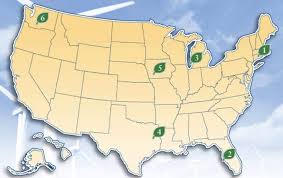Spotlight
April 2014 Newsletter
In 2011, EDA awarded six i6 Green Challenge Winners. The $12 million i6 green challenge was a collaboration between EDA’s Office of Innovation and Entrepreneurship, the U.S. Environmental Protection Agency, the National Science Foundation, the U.S. Departments of Agriculture and Energy, as well as Commerce’s National Institute of Standards and Technology and U.S. Patent and Trademark Office. EDA made awards of $1 million to the six organizations with the most innovative ideas to drive technology, commercialization, and entrepreneurship in support of green innovation.
Louisiana Tech created a proof of concept center to move green innovations to market using a project-based partnership model that brought university and commercialization partners together to collaborate on field/site testing and deployment of new technologies. To date, the project has generated $5.2 million in private funding committed by 16 partners across the energy, construction materials, and biosciences sectors. The center has also succeeded in licensing 10 technologies with 8 commercial partners to take them to market. Three regional companies have launches and three regional companies have expanded.
The Iowa Innovation Network, Iowa Department of Economic Development, and Iowa State University developed an innovative proof of concept and proof of commercialization that supports centers that accelerate the launch of new firms to spur job creation and contribute to economic growth in Iowa. Several of the companies supported by Iowa’s grant have introduced products to the market with many more undergoing testing and certification. MCG Biocomposites has introduced two varieties of MCG Biomarkers, which are eco-friendly plant markers for gardening. ReWall developed several construction materials made from 100 percent recycled materials. The existing products and the strong pipeline of other products are poised to make a positive impact economically for Iowa and globally for the environment.
New England’s Cleantech Innovations New England (CINE) program has directly managed eight solicitations, evaluated more than 165 different businesses and awarded a total of $381,000 of direct financial support to 15 companies in 11 different cleantech sectors in the past two years. These awards resulted in the creation of more than 25 jobs throughout the region and $15.5 million of follow on funding to date. Altaeros Energies, a wind energy company formed out of MIT received a $20,000 grant from CINE’s Utility Challenge Grant Program in 2012 and is preparing for the first commercial pilot of its airborne wind turbine technology in Alaska. The $1.3 million 18-month project is expected to break the world record for the highest wind turbine ever deployed at 1,000 feet.
Michigan State University’s Bioeconomy Institute works with entrepreneurs and client firms to commercialize green research discoveries. Some of the technologies that the “proof of concept” center supported include a commercial line of animal bedding using fiber waste called EcoComposites, a line of thermochromic windows for energy conservation in buildings from Pleotint, and technology for controlling fats, oils, and grease in sanitary sewers and septic fields that is reportedly in use at 18 regional McDonald’s franchises plus other sites. In addition, the i6 green assisted company Marrone BioInnovations has opened a production facility in a re-purposed biodiesel plant in Bangor, Michigan.
The Florida Cleantech Acceleration Network (i6) and MegaWatt Ventures programs, now known collectively as the Innovation Concourse of the Southeast, offer participating companies and researchers receive one-on-one coaching, entrepreneurship education workshops, live industry networking opportunities, UCF Mentor Network access, templates and resources, and other support for their technology, business and management development. To date, the program has fostered technology scouting and investment scouting connections for clients and university researchers with over 160 Fortune 1000 and other large corporations, especially focusing on sustainability, facility and fleet management product decision makers. In 3 years of operation, the program has supported 300+ companies from throughout the state of Florida, incorporated 33 new Florida and another 12 new Southeastern university spin-outs.
The i6 Green Challenge Team was formed in Washington to remove barriers for Seattle’s Energy Efficiency Cluster and created the Smart Buildings Center and High-Performance Buildings Project. The Smart Building Center pulls together real-time energy data from buildings nationwide so companies can learn what technology works best for their type of facility. The High-Performance Buildings Project seeks to prove that commercial building owners can save 10-25% by using Cloud technology to manage their existing building equipment. In November, one of the participating buildings saw a 3.4% reduction in electricity consumption and 2.15% reduction in natural gas consumption. In December, another facility saw a 2.28% reduction in electricity consumption. In order to train building operators to run these new, smarter buildings, there is also a workforce development component to the project. South Seattle Community College is developing the nation’s first Bachelors of Applied Science degree designed by industry to train employees with the skills industry needs and is recruiting students for the fall semester.



